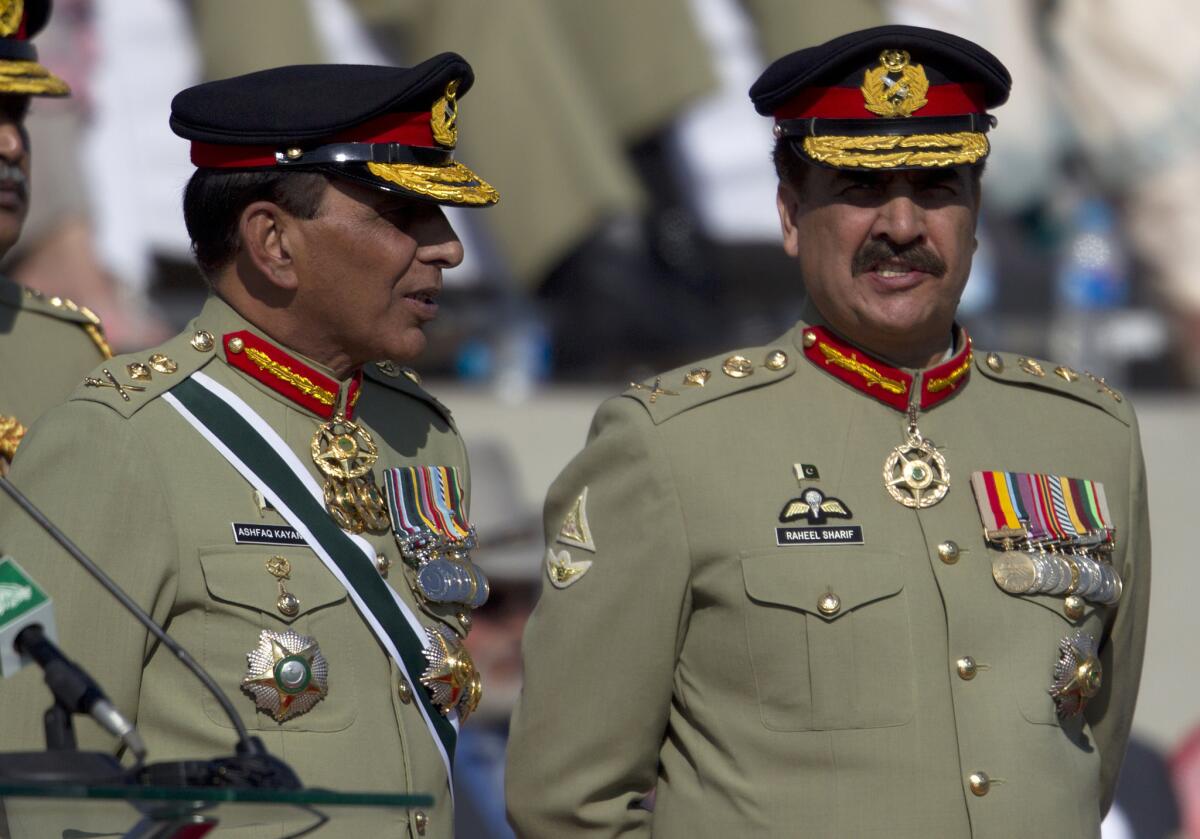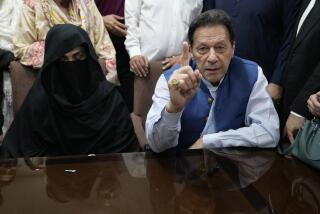Pakistan’s new army chief: What it means for the U.S.

Pakistan’s retiring army chief, Gen. Ashfaq Kayani, last week passed the baton of his nation’s most powerful institution to Gen. Raheel Sharif. A fresh face at the helm of the Pakistani military undoubtedly raises American hopes for a less frustrating relationship, as the last six years of dealing with Kayani were anything but smooth. Realistically, however, Washington should keep its expectations firmly in check and at least one eye out for trouble.
Prime Minister Nawaz Sharif (no relation to the new army chief) managed the selection process with abundant caution. The three-time prime minister knows from personal experience how dangerous the civil-military game can be. In 1999, his last pick for the top military post, Gen. Pervez Musharraf, forced him from office and into nearly a decade of exile.
And that was hardly the worst fate suffered by a Pakistani prime minister at the hands of his hand-selected army chief. In 1976, Prime Minister Zulfikar Ali Bhutto elevated Gen. Zia ul-Haq, in part because of Zia’s apparent disinterest in all things political. But Zia defied expectations and overthrew Bhutto in 1977, then had him hanged two years later.
YEAR IN REVIEW: Washington’s 5 biggest ‘fails’ of 2013
In selecting Raheel Sharif, the prime minister chose the third-most senior army officer, showing due deference to the norms of the status-conscious military. Yet the prime minister passed over the candidate rumored to enjoy Kayani’s favor and left aside another general said to have Washington’s stamp of approval.
In so doing, Nawaz Sharif demonstrated political independence from both the army and America, two of three forces popularly said to dominate so much of what happens in Pakistan (the third force being Allah). The prime minister kept his choice a secret until the very last moment, frustrating observers who saw his delays as evidence of indecision, but in fact shrewdly denying opportunities to potential troublemakers.
Pakistan desperately needs capable civilian leaders who can manage their relations with the military. If the two Sharifs can see eye to eye on the main security threats that plague their country, starting with Pakistan’s homegrown Taliban and Karachi’s ethno-political violence, they could form a more potent duo than Pakistan has seen in decades. That would be no small feat. Given recurring U.S. fears that Pakistan could unravel at its seams, Washington has every reason to root for success.
That said, U.S. and Pakistani interests have never been fully aligned, especially when it comes to relations with India, the war in Afghanistan, Pakistan’s expanding nuclear arsenal and the uncomfortable reality that some of the region’s worst terrorist groups continue to find haven on Pakistani soil. Washington should anticipate Raheel Sharif’s initial intransigence on these contentious matters because he is a product, through and through, of the institution he now leads.
Also, like any new chief executive of a sprawling organization, the general’s top priority will be to consolidate his grip on all of the important levers of power. Along with appointing and promoting loyalists, he will almost certainly want to cultivate a reputation for greater independence from the U.S. The last two army chiefs — Kayani and Musharraf — have been lambasted by the rank and file and resented by many senior officers for their perceived close cooperation with Washington.
For similar reasons, Raheel Sharif will probably wish to show his bona fides as an India hawk, long an essential qualification for the army’s top job. Another crisis or skirmish with India, precipitated by a terrorist attack or a border dispute, would be perfectly in keeping with the historical pattern of his recent predecessors. To help prevent a repetition of this dangerous pattern, the U.S. intelligence community should keep an especially watchful eye on the Indo-Pakistani border over the coming months.
To kick off official dealings with Pakistan’s new army chief, U.S. diplomats should ask Pakistan’s civilian government to include the general in the next round of ministerial-level talks in Washington, scheduled for early 2014. By working through civilian channels and stressing the importance of joint civil-military discussions, Washington would avoid its unhealthy historical pattern of appearing to privilege military-to-military relationships over civilian ones.
In bilateral security talks, the U.S. should lead with quiet offers of equipment, training and intelligence-sharing to assist Pakistan’s fight against homegrown Taliban militants. But U.S. officials should also deliver sterner messages about matters where there has been frustration and disagreement. They should stress that the U.S. commitment to combating international terrorism, limiting nuclear proliferation and encouraging peace in Pakistan’s neighborhood will endure with or without Pakistan’s full cooperation.
These messages should be delivered not with the naive vision of forcing any strategic about-face by Pakistan’s army chief in the near term, but with the more reasonable hope that candor will improve future prospects for cooperation once the general has settled into his new role.
Daniel Markey is a senior fellow for India, Pakistan and South Asia at the Council on Foreign Relations. He was a member of the policy planning staff in the State Department from 2003 to 2007 and is the author of “No Exit From Pakistan: America’s Tortured Relationship With Islamabad.”
More to Read
A cure for the common opinion
Get thought-provoking perspectives with our weekly newsletter.
You may occasionally receive promotional content from the Los Angeles Times.






